ANG
-
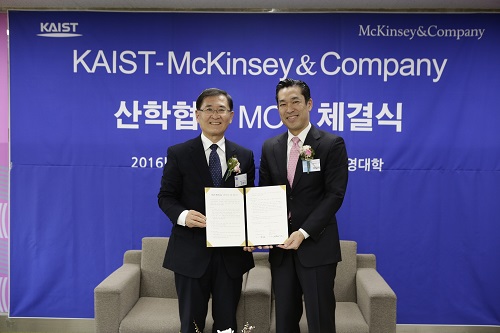 KAIST and McKinsey Korea Agreed to Cultivate Management Leaders
KAIST and McKinsey Korea signed a memorandum of understanding (MOU) for the “Joint Research on Innovative Instructional Method to Cultivate Future Management Leaders” on April 8, 2016, at the SUPEX Management Hall of KAIST Management School in Seoul.
Under the MOU, both organizations will cooperate in the following research areas: management strategies to overcome the low growth of Korean economy, instructional methods to foster leaders in the field of business and management, and innovative management systems for business.
President Kang said, “We are pleased to work with McKinsey, a worldwide management consulting firm, to foster leaders in science and business. As we see more demanding challenges of managing and leading science-based businesses today, this alliance is indeed timely and will be very helpful.”
2016.04.15 View 6232
KAIST and McKinsey Korea Agreed to Cultivate Management Leaders
KAIST and McKinsey Korea signed a memorandum of understanding (MOU) for the “Joint Research on Innovative Instructional Method to Cultivate Future Management Leaders” on April 8, 2016, at the SUPEX Management Hall of KAIST Management School in Seoul.
Under the MOU, both organizations will cooperate in the following research areas: management strategies to overcome the low growth of Korean economy, instructional methods to foster leaders in the field of business and management, and innovative management systems for business.
President Kang said, “We are pleased to work with McKinsey, a worldwide management consulting firm, to foster leaders in science and business. As we see more demanding challenges of managing and leading science-based businesses today, this alliance is indeed timely and will be very helpful.”
2016.04.15 View 6232 -
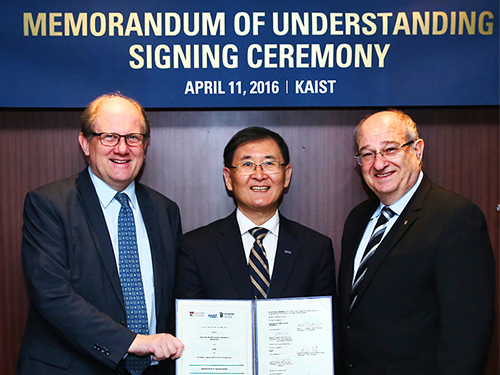 KAIST, NTU, and Technion Collaborate for Research in Emerging Fields
KAIST, Nanyang Technological University (NTU) of Singapore, and Technion of Israel signed an agreement on April 11, 2016 in Seoul to create a five-year joint research program for some of the most innovative and entrepreneurial areas: robotics, medical technologies, satellites, materials science and engineering, and entrepreneurship. Under the agreement, the universities will also offer dual degree opportunities, exchange visits, and internships.
In the picture from the left, Bertil Andersson of NTU, Sung-Mo Kang of KAIST, and Peretz Lavie of Technion hold the signed memorandum of understanding.
2016.04.14 View 12838
KAIST, NTU, and Technion Collaborate for Research in Emerging Fields
KAIST, Nanyang Technological University (NTU) of Singapore, and Technion of Israel signed an agreement on April 11, 2016 in Seoul to create a five-year joint research program for some of the most innovative and entrepreneurial areas: robotics, medical technologies, satellites, materials science and engineering, and entrepreneurship. Under the agreement, the universities will also offer dual degree opportunities, exchange visits, and internships.
In the picture from the left, Bertil Andersson of NTU, Sung-Mo Kang of KAIST, and Peretz Lavie of Technion hold the signed memorandum of understanding.
2016.04.14 View 12838 -
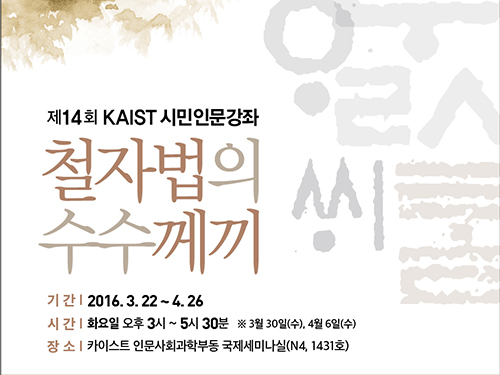 Public Lectures on the Korean Language and Alphabet
The School of Humanities and Social Sciences at KAIST will offer public lectures on the Korean language and alphabet, Hangul, from March 22, 2016 to April 26, 2016.
The lectures, which are entitled “The Riddle of Hangul,” will take place on campus in Daejeon.
A total of six lectures will be held on such topics as the origin of Korean, the grammar of ancient Korean in the Chosun Dynasty (1392-1897), and subsequent developments in contemporary Korean.
Professor Jung-Hoon Kim, who is responsible for organizing the public lecture program, said, “The audience will have an interesting opportunity to understand the history of Korean and its mechanism, while reviewing the unique spelling system of Hangul. I hope many people will show up for these wonderful classes.”
For further information and registration, please visit: http://hss.kaist.ac.kr. All lectures, available only in Korean, are free and open to the public.
2016.03.15 View 9687
Public Lectures on the Korean Language and Alphabet
The School of Humanities and Social Sciences at KAIST will offer public lectures on the Korean language and alphabet, Hangul, from March 22, 2016 to April 26, 2016.
The lectures, which are entitled “The Riddle of Hangul,” will take place on campus in Daejeon.
A total of six lectures will be held on such topics as the origin of Korean, the grammar of ancient Korean in the Chosun Dynasty (1392-1897), and subsequent developments in contemporary Korean.
Professor Jung-Hoon Kim, who is responsible for organizing the public lecture program, said, “The audience will have an interesting opportunity to understand the history of Korean and its mechanism, while reviewing the unique spelling system of Hangul. I hope many people will show up for these wonderful classes.”
For further information and registration, please visit: http://hss.kaist.ac.kr. All lectures, available only in Korean, are free and open to the public.
2016.03.15 View 9687 -
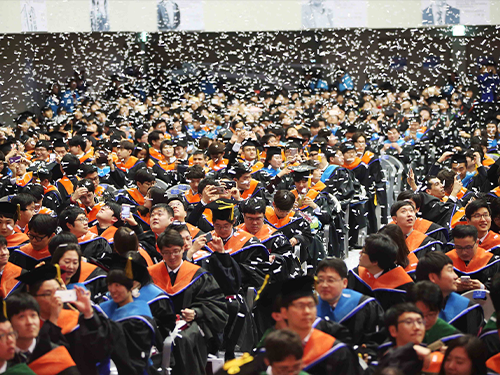 KAIST Commencement 2016
KAIST hosted its 2016 commencement ceremony on February 19, 2016 at the Sports Complex on campus.
KAIST celebrated the event with five thousand participants including graduating students, faculty, guests, Vice Minister Nam-Ki Hong of Science, ICT and Future Planning of Korea, Chairman Jang-Moo Lee of KAIST's Board of Trustees, and President Jeong-Sik Ko of the KAIST Alumni Association.
President Patrick Aebischer of the Swiss Federal Institute of Technology in Lausanne (EPFL), Switzerland, and the former Speaker of the National Assembly of Korea Chang-Hee Kang received honorary doctorates in science and technology for their contributions to the advancement of science and engineering in education and research.
KAIST granted 570 doctoral degrees, 1,329 master’s degrees, and 867 bachelor degrees on this day.
Yoon-Bum Lee of the Chemistry Department graduated with honors; Woo-Young Jin of the Mathematical Sciences Department received the Chairman’s Award of the KAIST Board and Eun-Hee Yoo of the Biological Sciences Department for the KAIST Presidential Award. Min-Hyun Cho and Yoon-Seok Chang were recipients of the President’s Award of the KAIST Alumni Association and the President’s Award of the University Supporting Association, respectively.
President Steve Kang addressed the ceremony and congratulated the graduates, saying,
“Now, your task is to make significant contributions to your communities: be leaders in your fields and remain active members of society. Given your academic knowledge and vision for the future, I encourage you to dream big.”
2016.02.23 View 43130
KAIST Commencement 2016
KAIST hosted its 2016 commencement ceremony on February 19, 2016 at the Sports Complex on campus.
KAIST celebrated the event with five thousand participants including graduating students, faculty, guests, Vice Minister Nam-Ki Hong of Science, ICT and Future Planning of Korea, Chairman Jang-Moo Lee of KAIST's Board of Trustees, and President Jeong-Sik Ko of the KAIST Alumni Association.
President Patrick Aebischer of the Swiss Federal Institute of Technology in Lausanne (EPFL), Switzerland, and the former Speaker of the National Assembly of Korea Chang-Hee Kang received honorary doctorates in science and technology for their contributions to the advancement of science and engineering in education and research.
KAIST granted 570 doctoral degrees, 1,329 master’s degrees, and 867 bachelor degrees on this day.
Yoon-Bum Lee of the Chemistry Department graduated with honors; Woo-Young Jin of the Mathematical Sciences Department received the Chairman’s Award of the KAIST Board and Eun-Hee Yoo of the Biological Sciences Department for the KAIST Presidential Award. Min-Hyun Cho and Yoon-Seok Chang were recipients of the President’s Award of the KAIST Alumni Association and the President’s Award of the University Supporting Association, respectively.
President Steve Kang addressed the ceremony and congratulated the graduates, saying,
“Now, your task is to make significant contributions to your communities: be leaders in your fields and remain active members of society. Given your academic knowledge and vision for the future, I encourage you to dream big.”
2016.02.23 View 43130 -
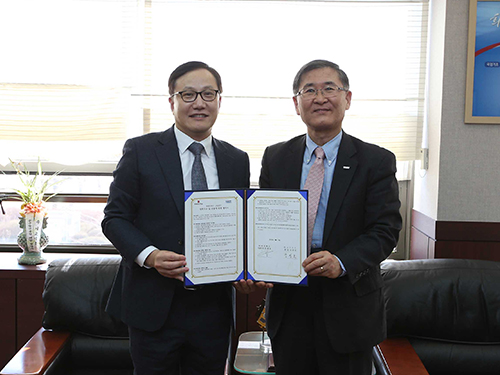 Meditox Donates 600 Million KRW Scholarship
On February 17, a Korean biopharmaceutical company Meditox, headed by Chief Executive Officer (CEO) Hyun-Ho Jeong, signed a memorandum of understanding (MOU) with KAIST to establish the “Meditox Fellowship” and donated a total of 600 million Korean won (KRW) to the university to assist in promoting more scientists in the field of biology.
Meditox CEO Hyun-Ho Jeong, KAIST President Steve Kang, Dean of Life Science and Bioengineering College Jung-Hoe Kim, and Dean of the Department of Biological Sciences Byung-Ha Oh participated in the agreement ceremony.
According to the MOU, Meditox will donate 60,000,000 KRW over a ten year period, from which KAIST can draw on to grant scholarships for master’s and doctoral students.
The “Meditox Fellowship” will support promising and enthusiastic students whose finances limit their studies. The first scholarship students for 2016 were: Kwang-Uk Min, In-suk Yeo, Sung-ryung- Lee, Si-on Lee, and Jung-hyun Kim.
Meditox CEO Jeong, who graduated from KAIST’s Department of Biological Sciences, said, "I felt it was important to start the Meditox Fellowship at my alma mater to contribute to the cultivation of outstanding scientists in the field of biological sciences."
He also said that he would plan to launch projects that aim to support not only those who receive the scholarship but also the development of Korea’s biological sciences in general.
President Steve Kang (right) and Chief Executive Officer Hyun-Ho Jeong (left) of Meditox hold the signed memorandum of understanding together.
2016.02.18 View 11176
Meditox Donates 600 Million KRW Scholarship
On February 17, a Korean biopharmaceutical company Meditox, headed by Chief Executive Officer (CEO) Hyun-Ho Jeong, signed a memorandum of understanding (MOU) with KAIST to establish the “Meditox Fellowship” and donated a total of 600 million Korean won (KRW) to the university to assist in promoting more scientists in the field of biology.
Meditox CEO Hyun-Ho Jeong, KAIST President Steve Kang, Dean of Life Science and Bioengineering College Jung-Hoe Kim, and Dean of the Department of Biological Sciences Byung-Ha Oh participated in the agreement ceremony.
According to the MOU, Meditox will donate 60,000,000 KRW over a ten year period, from which KAIST can draw on to grant scholarships for master’s and doctoral students.
The “Meditox Fellowship” will support promising and enthusiastic students whose finances limit their studies. The first scholarship students for 2016 were: Kwang-Uk Min, In-suk Yeo, Sung-ryung- Lee, Si-on Lee, and Jung-hyun Kim.
Meditox CEO Jeong, who graduated from KAIST’s Department of Biological Sciences, said, "I felt it was important to start the Meditox Fellowship at my alma mater to contribute to the cultivation of outstanding scientists in the field of biological sciences."
He also said that he would plan to launch projects that aim to support not only those who receive the scholarship but also the development of Korea’s biological sciences in general.
President Steve Kang (right) and Chief Executive Officer Hyun-Ho Jeong (left) of Meditox hold the signed memorandum of understanding together.
2016.02.18 View 11176 -
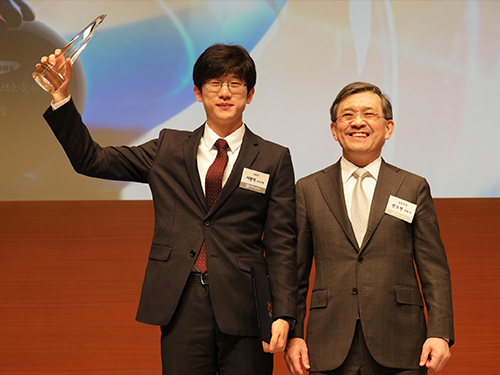 Ph.D. Candidate Seo Wins the Human Tech Paper Award
Hyun-Suk Seo, a doctoral student of KAIST’s Department of Electrical Engineering, received the grand prize of the “22nd Human Tech Paper Award” on February 3, 2016 from Samsung Electronics Co., Ltd.
Seo was the first to receive this prize ever since the Human Tech Paper Award was established 22 years ago. Until last year, the highest prize awarded for KAIST was a gold one.
The “Human Tech Paper Award” was established in 1994 by Samsung Electronics to discover and support outstanding scientists in the field of electrical engineering.
Entitled “Self-Gated Cardiac Cine MRI Using Phase Information,” Seo’s paper presented a technology that would reduce discomforts and inconveniences experienced by patients who take a magnetic resonance imaging (MRI).
This technology uses the speed changes of aorta and the abdominal movements of body to obtain the phase changes of magnetic resonance signals so that MRIs may be taken despite the organs’ movements.
Seo commented on his research, “I wanted to develop a technique that can make MRI a more comfortable experience. I will continue my research on this subject and hope to serve the needs of the society.”
In addition, the “Special Award,” which is given to schools, was awarded to KAIST. KAIST’s Department of Electrical Engineering has also been named the department that has received the second most awards (15 awards) this year.
Oh-Hyun Kwon, Vice President of Samsung Electronics, Steve Kang, President of KAIST, and Nak-In Seo, President of Seoul National University, participated in the event.
Picture: Hyun-Suk Seo (left), the recipient of the grand prize of the 2016 Human Tech Paper Award, and Oh-Hyun Kwon (right), Vice President of Samsung Electronics
2016.02.06 View 10197
Ph.D. Candidate Seo Wins the Human Tech Paper Award
Hyun-Suk Seo, a doctoral student of KAIST’s Department of Electrical Engineering, received the grand prize of the “22nd Human Tech Paper Award” on February 3, 2016 from Samsung Electronics Co., Ltd.
Seo was the first to receive this prize ever since the Human Tech Paper Award was established 22 years ago. Until last year, the highest prize awarded for KAIST was a gold one.
The “Human Tech Paper Award” was established in 1994 by Samsung Electronics to discover and support outstanding scientists in the field of electrical engineering.
Entitled “Self-Gated Cardiac Cine MRI Using Phase Information,” Seo’s paper presented a technology that would reduce discomforts and inconveniences experienced by patients who take a magnetic resonance imaging (MRI).
This technology uses the speed changes of aorta and the abdominal movements of body to obtain the phase changes of magnetic resonance signals so that MRIs may be taken despite the organs’ movements.
Seo commented on his research, “I wanted to develop a technique that can make MRI a more comfortable experience. I will continue my research on this subject and hope to serve the needs of the society.”
In addition, the “Special Award,” which is given to schools, was awarded to KAIST. KAIST’s Department of Electrical Engineering has also been named the department that has received the second most awards (15 awards) this year.
Oh-Hyun Kwon, Vice President of Samsung Electronics, Steve Kang, President of KAIST, and Nak-In Seo, President of Seoul National University, participated in the event.
Picture: Hyun-Suk Seo (left), the recipient of the grand prize of the 2016 Human Tech Paper Award, and Oh-Hyun Kwon (right), Vice President of Samsung Electronics
2016.02.06 View 10197 -
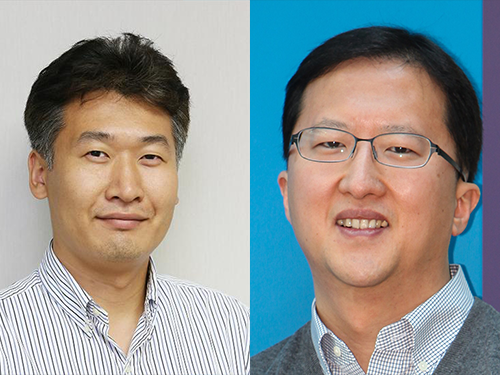 Professors Jeon and Choi Receive the Young Scientist Award
Professors Seokwoo Jeon of the Department of Materials Science and Engineering and Jang Wook Choi of the Graduate School of Energy, Environment, Water and Sustainability (EEWS) at KAIST received the Young Scientist Award.
The award ceremony took place at the Korea Press Center in Seoul. Presented by the Ministry of Science, ICT and Future Planning of Korea and the National Academy of Engineering of Korea, the Young Scientist Award is given to outstanding scientists under the age of 40 who have demonstrated excellence in their research in the field of natural science.
Each year the award is given to three scientists in different areas.
Professor Jeon was recognized for his achievement in creating a new property of materials. He studied synthesis and development of low-dimensional nanomaterials and developed a large area nanostructure.
Professor Choi’s research area was to discover optimal materials for rechargeable batteries. By applying his research, he developed rechargeable batteries with high efficiency, making the wearable system more feasible.
2016.01.11 View 13273
Professors Jeon and Choi Receive the Young Scientist Award
Professors Seokwoo Jeon of the Department of Materials Science and Engineering and Jang Wook Choi of the Graduate School of Energy, Environment, Water and Sustainability (EEWS) at KAIST received the Young Scientist Award.
The award ceremony took place at the Korea Press Center in Seoul. Presented by the Ministry of Science, ICT and Future Planning of Korea and the National Academy of Engineering of Korea, the Young Scientist Award is given to outstanding scientists under the age of 40 who have demonstrated excellence in their research in the field of natural science.
Each year the award is given to three scientists in different areas.
Professor Jeon was recognized for his achievement in creating a new property of materials. He studied synthesis and development of low-dimensional nanomaterials and developed a large area nanostructure.
Professor Choi’s research area was to discover optimal materials for rechargeable batteries. By applying his research, he developed rechargeable batteries with high efficiency, making the wearable system more feasible.
2016.01.11 View 13273 -
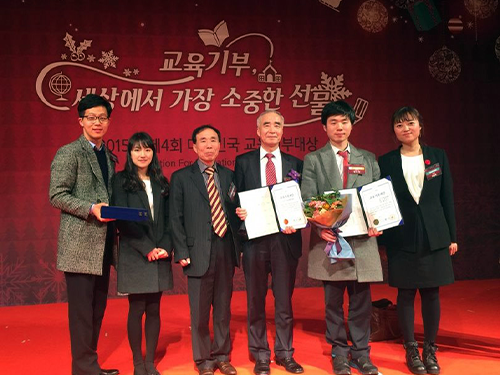 KAIST Wins the Korea Donation for Education Awards 2015
KAIST received the grand prize for the university section at the Korea Donation for Education Awards 2015. The award ceremony took place at Seoul Plaza Hotel on December 15, 2015.
The Ministry of Education created the award in 2012 to raise awareness about the need for charitable donations for education and to encourage the public’s participation in such endeavors. Recipients have included private companies, public institutions, non-profit organizations, universities, and individuals who have made notable contributions to education, for example, by offering educational programs or fundraising for such programs throughout a year.
Many organizations within KAIST, including the KAIST Center of Donation for Education, the Midam Scholarship Committee, the Donation for Software Education Group, the Chalk Academy, KAIST Student Volunteers, and K-LET, have been collectively recognized for their efforts to develop educational materials and managing academic camps and programs.
In addition to the grand prize which KAIST won, the Ministry of Education gave Neung-In Jang, a student pursuing a social entrepreneurship MBA at KAIST, an award for his efforts to provide quality education to teenagers by establishing the Midam Scholarship Committee in 2009. The Scholarship aims to revitalize the culture of donation for education by offering free math and science classes to high school students who are less privileged and by inspiring other universities in Korea to follow suit the committee’s volunteering activities.
2015.12.22 View 10626
KAIST Wins the Korea Donation for Education Awards 2015
KAIST received the grand prize for the university section at the Korea Donation for Education Awards 2015. The award ceremony took place at Seoul Plaza Hotel on December 15, 2015.
The Ministry of Education created the award in 2012 to raise awareness about the need for charitable donations for education and to encourage the public’s participation in such endeavors. Recipients have included private companies, public institutions, non-profit organizations, universities, and individuals who have made notable contributions to education, for example, by offering educational programs or fundraising for such programs throughout a year.
Many organizations within KAIST, including the KAIST Center of Donation for Education, the Midam Scholarship Committee, the Donation for Software Education Group, the Chalk Academy, KAIST Student Volunteers, and K-LET, have been collectively recognized for their efforts to develop educational materials and managing academic camps and programs.
In addition to the grand prize which KAIST won, the Ministry of Education gave Neung-In Jang, a student pursuing a social entrepreneurship MBA at KAIST, an award for his efforts to provide quality education to teenagers by establishing the Midam Scholarship Committee in 2009. The Scholarship aims to revitalize the culture of donation for education by offering free math and science classes to high school students who are less privileged and by inspiring other universities in Korea to follow suit the committee’s volunteering activities.
2015.12.22 View 10626 -
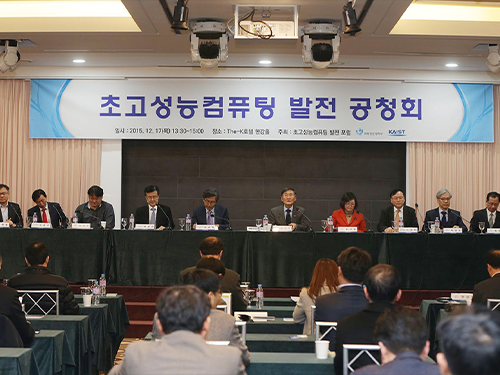 Public Forum on the Development of High-Performance Supercomputing System
KAIST hosted a public forum on the development of high-performance supercomputing systems at the K Hotel in Seoul on December 17, 2015.
About 100 participants attended the forum, including Steve Kang, the President of KAIST; Jae-Moon Park, the Director General of Science, ICT and Future Planning of the Republic of Korea; Sun-Hwa Hahn, the President of the Korea Institute of Science and Technology Information; Sang-Gyu Park, the Director of the Electronics and Telecommunications Research Institute; Soon-Chill Lee, the Dean of KAIST’s Natural Sciences College; Jangwoo Kim, the Professor of Computer Science and Engineering of Pohang University of Science and Technology; and Kyung-Hak Suh, the Director of Convergence Technology Division at the National Research Foundation of Korea.
Also attending the forum were representatives from the private sector, including Sung-Soon Park, the President of Gluesys; Myung-Chul Lee, the Director of IMB Korea; Jin-Hyun Choi, the President of Cray Korea; and Chung-Gun Yoo, the Director of HP Korea.
KAIST created the High-performance Computing Development Forum in July this year. Since then, the forum has held four conferences and workshops to discuss issues related to the growth of supercomputing power in Korea.
This public forum consisted of a keynote speech on the “Policy Proposal for the Development of Supercomputers” by Professor Hyuk-Jae Lee of the Electrical and Computer Engineering Department at Seoul National University and panel discussions presided over by President Kang on the topic of “Development and Implementation Strategies to Build Korean Supercomputers.”
President Kang said, “I hope this public forum can serve as a place for designing the future of Korean supercomputers, and what we have discussed at the forum will be duly delivered to the government to help them develop policies necessary to build the computers.”
2015.12.16 View 8315
Public Forum on the Development of High-Performance Supercomputing System
KAIST hosted a public forum on the development of high-performance supercomputing systems at the K Hotel in Seoul on December 17, 2015.
About 100 participants attended the forum, including Steve Kang, the President of KAIST; Jae-Moon Park, the Director General of Science, ICT and Future Planning of the Republic of Korea; Sun-Hwa Hahn, the President of the Korea Institute of Science and Technology Information; Sang-Gyu Park, the Director of the Electronics and Telecommunications Research Institute; Soon-Chill Lee, the Dean of KAIST’s Natural Sciences College; Jangwoo Kim, the Professor of Computer Science and Engineering of Pohang University of Science and Technology; and Kyung-Hak Suh, the Director of Convergence Technology Division at the National Research Foundation of Korea.
Also attending the forum were representatives from the private sector, including Sung-Soon Park, the President of Gluesys; Myung-Chul Lee, the Director of IMB Korea; Jin-Hyun Choi, the President of Cray Korea; and Chung-Gun Yoo, the Director of HP Korea.
KAIST created the High-performance Computing Development Forum in July this year. Since then, the forum has held four conferences and workshops to discuss issues related to the growth of supercomputing power in Korea.
This public forum consisted of a keynote speech on the “Policy Proposal for the Development of Supercomputers” by Professor Hyuk-Jae Lee of the Electrical and Computer Engineering Department at Seoul National University and panel discussions presided over by President Kang on the topic of “Development and Implementation Strategies to Build Korean Supercomputers.”
President Kang said, “I hope this public forum can serve as a place for designing the future of Korean supercomputers, and what we have discussed at the forum will be duly delivered to the government to help them develop policies necessary to build the computers.”
2015.12.16 View 8315 -
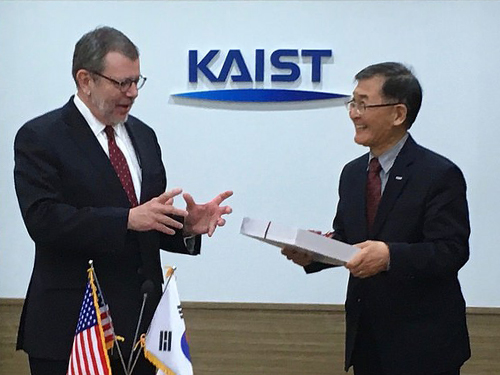 KAIST and the University of Minnesota-Twin Cities Partner for Research and Education Collaboration
President Steve Kang of KAIST and President Eric W. Kaler of the University of Minnesota-Twin Cities (United States) signed a memorandum of understanding to create exchange programs for students and faculty and to conduct joint research in the field of health and food. The following is an excerpt from President Kaler’s blog (https://storify.com/UMNstory/globalumn-hksk#edaadf) on his visit of KAIST on November 18, 2015:
A visit to the Korea Advanced Institute of Science and Technology
About 90 miles from Seoul—and more than that two-and-a-half-hours of a bus ride through the rugged early-morning traffic of South Korea’s capital city—sits Daejeon, Korea’s sixth largest city and home to KAIST, the Korea Advanced Institute of Science and Technology. Today, President Kaler and the small University of Minnesota delegation accompanying him visited what’s considered Korea’s MIT, a place focused on research and known to push the limits toward the future.
Fingernail heart monitors? Wireless anesthetic-monitoring devices?
KAIST is working on them.
The overlap of interests—from biomedical engineering to nanotechnology to robotics—between KAIST (pronounced “Kyst”) and the U are remarkable. Smartphone apps to monitor human health and GPS-driven robots to serve military interests or deliver packages were among the developing inventions that KAIST scientists showed to Kaler.
And even the personal relationships seem to illustrate the cliché of a small world and the natural affinity of Minnesota and KAIST.
KAIST’s President Sang Mo Kang was once the head of the University of Illinois’ department of electrical and computer engineering, and he and Kaler—a renowned chemical engineer before becoming the U’s president—hit it off … despite disagreeing about the potential outcome of Saturday’s Illinois-Gophers football game.
Accompanying Kaler on the day’s journey, meetings, and signing of a Memorandum of Understanding between the two schools to advance collaborations was U Associate Professor Sang Hyun Oh. Oh happens to be a physics graduate of this very KAIST and is now a rising star in Minnesota’s Department of Electrical and Computer Engineering.
The two sides agreed to focus on matching scholars on their respective campuses to discuss the sorts of research the two institutions can partner on. The idea of “Grand Challenges,” at the core of the U’s Twin Cities campus Strategic Plan, has fascinated Korean higher education leaders during Kaler’s weeklong visit, and KAIST’s leadership was interested in the health and food research, two U strengths.
###
2015.12.04 View 9257
KAIST and the University of Minnesota-Twin Cities Partner for Research and Education Collaboration
President Steve Kang of KAIST and President Eric W. Kaler of the University of Minnesota-Twin Cities (United States) signed a memorandum of understanding to create exchange programs for students and faculty and to conduct joint research in the field of health and food. The following is an excerpt from President Kaler’s blog (https://storify.com/UMNstory/globalumn-hksk#edaadf) on his visit of KAIST on November 18, 2015:
A visit to the Korea Advanced Institute of Science and Technology
About 90 miles from Seoul—and more than that two-and-a-half-hours of a bus ride through the rugged early-morning traffic of South Korea’s capital city—sits Daejeon, Korea’s sixth largest city and home to KAIST, the Korea Advanced Institute of Science and Technology. Today, President Kaler and the small University of Minnesota delegation accompanying him visited what’s considered Korea’s MIT, a place focused on research and known to push the limits toward the future.
Fingernail heart monitors? Wireless anesthetic-monitoring devices?
KAIST is working on them.
The overlap of interests—from biomedical engineering to nanotechnology to robotics—between KAIST (pronounced “Kyst”) and the U are remarkable. Smartphone apps to monitor human health and GPS-driven robots to serve military interests or deliver packages were among the developing inventions that KAIST scientists showed to Kaler.
And even the personal relationships seem to illustrate the cliché of a small world and the natural affinity of Minnesota and KAIST.
KAIST’s President Sang Mo Kang was once the head of the University of Illinois’ department of electrical and computer engineering, and he and Kaler—a renowned chemical engineer before becoming the U’s president—hit it off … despite disagreeing about the potential outcome of Saturday’s Illinois-Gophers football game.
Accompanying Kaler on the day’s journey, meetings, and signing of a Memorandum of Understanding between the two schools to advance collaborations was U Associate Professor Sang Hyun Oh. Oh happens to be a physics graduate of this very KAIST and is now a rising star in Minnesota’s Department of Electrical and Computer Engineering.
The two sides agreed to focus on matching scholars on their respective campuses to discuss the sorts of research the two institutions can partner on. The idea of “Grand Challenges,” at the core of the U’s Twin Cities campus Strategic Plan, has fascinated Korean higher education leaders during Kaler’s weeklong visit, and KAIST’s leadership was interested in the health and food research, two U strengths.
###
2015.12.04 View 9257 -
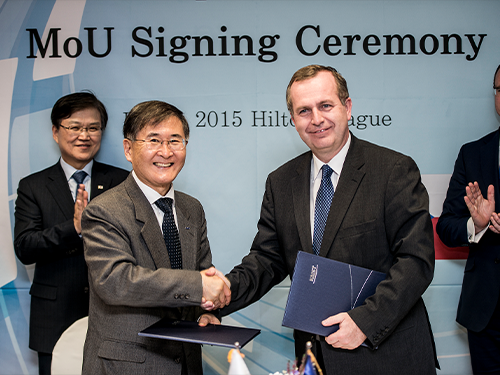 KAIST and Charles University Agree to Cooperate
KAIST and Charles University in Prague, the Czech Republic, agreed to cooperate in research and education.
President Steve Kang of KAIST (pictured on the left) and Rector Tomáš Zima of Charles University signed the agreement on December 2, 2015, at the Hilton Hotel in Prague.
Minster Yang-Hee Choi of Science, ICT and Future Planning of the Republic of Korea and Minister Kateřina Valachová of Education, Youth and Sports of the Czech Republic also joined the signing ceremony.
Under the agreement, the two institutions will exchange students and researchers, as well as implement joint research programs.
President Kang said, “We are pleased to work with one of the most prestigious universities in the Czech Republic and hope to build a good partnership in the years ahead.”
Founded in 1348, Charles University in Prague is the oldest and largest university in the Czech Republic. The university received two Nobel prizes in physiology or medicine and in chemistry in 1947 and 1959, respectively.
2015.12.03 View 8671
KAIST and Charles University Agree to Cooperate
KAIST and Charles University in Prague, the Czech Republic, agreed to cooperate in research and education.
President Steve Kang of KAIST (pictured on the left) and Rector Tomáš Zima of Charles University signed the agreement on December 2, 2015, at the Hilton Hotel in Prague.
Minster Yang-Hee Choi of Science, ICT and Future Planning of the Republic of Korea and Minister Kateřina Valachová of Education, Youth and Sports of the Czech Republic also joined the signing ceremony.
Under the agreement, the two institutions will exchange students and researchers, as well as implement joint research programs.
President Kang said, “We are pleased to work with one of the most prestigious universities in the Czech Republic and hope to build a good partnership in the years ahead.”
Founded in 1348, Charles University in Prague is the oldest and largest university in the Czech Republic. The university received two Nobel prizes in physiology or medicine and in chemistry in 1947 and 1959, respectively.
2015.12.03 View 8671 -
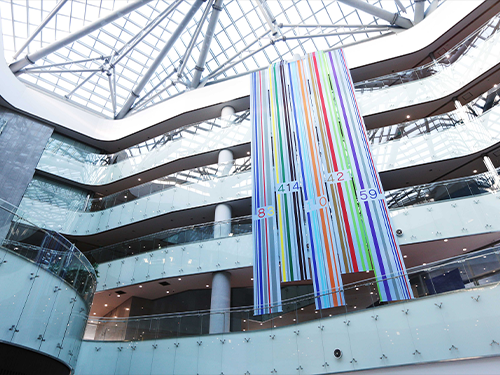 KAIST Holds Its Fourth Public Art Exhibition
KAIST hosted an opening ceremony for the annual art exhibition on December 3, 2015 at the KAIST Institute building. The KAIST Art and Design Committee first organized the event in 2012 to promote the integration of art and technology.
This year’s event entitled “Understanding the Purpose of an Object” will display 20 art pieces under six themes. Artist Keumhong Lee, Haeyool Roh, Joon Kim, Kyung Lee, and Juhae Yang participated in the exhibition. The names of some of the art pieces include “Feedback Field” by Joon Kim, “Self Action” by Haeyool Roh, and “Net of Time” by Juhae Yang.
Juhae Yang believes that, in the digital age, an identity of an object is defined by the traces of light which we read in the information hidden in the barcodes. Based on this interpretation, she transforms the black bars and white spaces into a harmony of colors and sounds. The continuum of colors and sounds in her work arouses time-space synesthesia.
Professor Sangmin Bae of the Industrial Design Department, the Director of the KAIST Art and Design Committee, hopes that the exhibition will inspire novel scientific ideas and artistic spirits.
The exhibition will remain open to the public until December 20, 2015.
2015.12.03 View 9718
KAIST Holds Its Fourth Public Art Exhibition
KAIST hosted an opening ceremony for the annual art exhibition on December 3, 2015 at the KAIST Institute building. The KAIST Art and Design Committee first organized the event in 2012 to promote the integration of art and technology.
This year’s event entitled “Understanding the Purpose of an Object” will display 20 art pieces under six themes. Artist Keumhong Lee, Haeyool Roh, Joon Kim, Kyung Lee, and Juhae Yang participated in the exhibition. The names of some of the art pieces include “Feedback Field” by Joon Kim, “Self Action” by Haeyool Roh, and “Net of Time” by Juhae Yang.
Juhae Yang believes that, in the digital age, an identity of an object is defined by the traces of light which we read in the information hidden in the barcodes. Based on this interpretation, she transforms the black bars and white spaces into a harmony of colors and sounds. The continuum of colors and sounds in her work arouses time-space synesthesia.
Professor Sangmin Bae of the Industrial Design Department, the Director of the KAIST Art and Design Committee, hopes that the exhibition will inspire novel scientific ideas and artistic spirits.
The exhibition will remain open to the public until December 20, 2015.
2015.12.03 View 9718